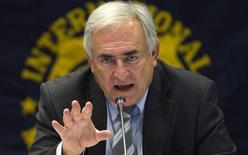Firewalls cannot resolve issues facing some European countries, warns IMF
The International Monetary Fund Wednesday warned that risk of another acute crisis in Europe remains a possibility, despite the progress made so far on building "firewalls" or bailout funds.

"The main risk remains that of another acute crisis in Europe. The building of the so-called firewalls, when it is completed, will represent major progress, but by themselves firewalls cannot solve the difficult fiscal, competitiveness, and growth issues that some of the European countries face," said Olivier Blanchard, IMF Economic Counselor and Director, Research Department, at the release of the latest World Economic Outlook report.
"The bad news on the macroeconomic front or the political front still carries the risk of triggering the type of dynamics that we saw last fall," Blanchard stated.
He stressed that the search should be for credible, long-term commitments, which could be achieved by passing measures that decrease trend spending and by putting in place fiscal rules that reduce deficits over time.
Insufficient progress in designing such a medium-term plan is especially noticeable in the United States and in Japan, Blanchard warned.
Turning to policies aimed at reducing risks, Blanchard advised a clear focus on Europe with further measures to decrease the links between sovereigns, the states, and the banks.
"These measures run from common deposit insurance to common regulation and supervision of banks. Now that the fiscal pact has been introduced, and is being put in place, euro countries should also explore the scope for issuing common sovereign bonds," he stated.
Another priority area of focus, according to the IMF official, is increase growth and decrease unemployment in advanced economies, and in particular in Europe.
"The search for structural and fiscal reforms that help in the long run, but do not depress demand in the short run, should be very high on the policy agenda. Such reforms probably hold the key to successful and durable exit from the crisis," Blanchard opined.
In its forecast, IMF has projected a global growth of 3.5 per cent for 2012, improving to 4.1 per cent for 2013.
The 17 countries that use the euro will see their economies shrink by 0.3 per cent this year, and expand by only 0.9 per cent in 2013, the IMF has forecast.
The predicted credit crunch is a major reason why Europe's economy is expected to suffer a mild recession this year and barely grow in 2013, the IMF said.
But the slowdown could be worse if European governments don't follow through on pledges to cut budget deficits and build up their bailout fund, the global organization has warned.
Large banks based in the European Union may reduce their balance sheets which include outstanding loans, securities and other assets by $2.6 trillion or 7 per cent of their total assets by the end of 2013, the IMF said.
Some reduction in credit, or "deleveraging," is necessary, the IMF said. Banks aren't able to borrow as freely as in the past and governments are requiring them to hold more capital.
About one-quarter of that reduction will come from reduced lending and could shrink the amount available for credit by 1.7 per cent, the IMF projects.
Raising capital can be a difficult step because it can dilute shareholders holdings. At the same time, IMF has urged the national regulators to restrain banks from using money for payouts of dividends to shareholders and bonuses to top bank executives.
The IMF advice comes at a juncture when a large number of Citigroup shareholders have rejected fat pay cheques for top executives.
Among the developing countries, IMF has maintained the projections given in January of 8.2 per cent growth for China, 6.9 per cent for India, and 3 per cent for Brazil. However for Russia, the IMF has projected a higher growth of 4 per cent.
Source:The Asia News.Net
- 555 reads
Human Rights
Fostering a More Humane World: The 28th Eurasian Economic Summi

Conscience, Hope, and Action: Keys to Global Peace and Sustainability

Ringing FOWPAL’s Peace Bell for the World:Nobel Peace Prize Laureates’ Visions and Actions

Protecting the World’s Cultural Diversity for a Sustainable Future

Puppet Show I International Friendship Day 2020

